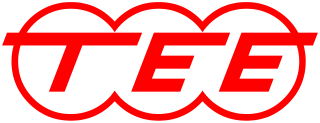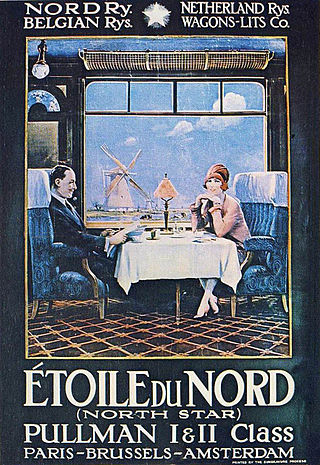
A member of the European Parliament (MEP) is a person who has been elected to serve as a popular representative in the European Parliament.
The Bruges Group is a think tank based in the United Kingdom. Founded in 1989, it advocates for a restructuring of Britain's relationship with the European Union and other European countries. Its members and staff campaign against the notion of an "ever-closer union" in Europe and, above all, against British involvement in a single European state. The group is often associated with the Conservative Party, including MPs such as Iain Duncan Smith, Daniel Hannan, John Redwood, and Norman Lamont. However, it is formally an independent all-party think tank, and some Labour MPs and peers have cited the publications or attended the meetings of the Bruges Group through the years, such as Frank Field, Gisela Stuart, Lord Stoddart of Swindon and Lord Shore of Stepney.

EuroCity (EC) is an international train category and brand for European inter-city trains that cross international borders and meet criteria covering comfort, speed, food service, and cleanliness. Each EC train is operated by more than one European Union or Swiss rail company, under a multilateral co-operative arrangement, and all EC trains link important European cities with each other.

The European Movement International is a lobbying association that coordinates the efforts of associations and national councils with the goal of promoting European integration, and disseminating information about it.

The Trans Europ Express, or Trans-Europe Express (TEE), was an international first-class railway service in western and central Europe that was founded in 1957 and ceased in 1995. At the height of its operations, in 1974, the TEE network comprised 45 trains, connecting 130 different cities, from Spain in the west to Austria in the east, and from Denmark to Southern Italy.
Political geography is concerned with the study of both the spatially uneven outcomes of political processes and the ways in which political processes are themselves affected by spatial structures. Conventionally, for the purposes of analysis, political geography adopts a three-scale structure with the study of the state at the centre, the study of international relations above it, and the study of localities below it. The primary concerns of the subdiscipline can be summarized as the inter-relationships between people, state, and territory.
PostEurop is the association of European public postal operators, one of the constituent unions of the Universal Postal Union. PostEurop was created in 1993 to simplify the exchange of mails in Europe, a task previously undertaken by the European Conference of Postal and Telecommunications Administrations. A smaller but similar organization is the Small European Postal Administration Cooperation.
EUobserver is a European online newspaper, launched in 2000 by the Brussels-based organisation EUobserver.com ASBL.

The Solvay Brussels School of Economics and Management is a school of economics and management, and a Faculty of the Université libre de Bruxelles (ULB), a French-speaking private research university located in Brussels, Belgium. Business education started in 1899, and Solvay was established in 1903 through a donation from the industrialist Ernest Solvay.
Knack is a Belgian Dutch-language weekly news magazine covering local news, politics, sports, business, jobs, and community events.

The Western Union (WU), also referred to as the Brussels Treaty Organisation (BTO), was the European military alliance established between France, the United Kingdom (UK) and the three Benelux countries in September 1948 in order to implement the Treaty of Brussels signed in March the same year. Under this treaty the signatories, referred to as the five powers, agreed to collaborate in the defence field as well as in the political, economic and cultural fields.

The Iris was an express train that linked Brussels Midi/Zuid in Brussels, Belgium, with Chur station in Chur, Switzerland.

The Edelweiss was an international express train. For most of its existence, it linked the Netherlands with Switzerland, via Belgium, Luxembourg and France. Introduced in 1928, it was named after a mountain flower, the Edelweiss, which is associated with alpinism and the Alps, and regarded as a symbol of Switzerland.

The Étoile du Nord was an international express train. It linked Paris Nord in Paris, France, with Brussels, Belgium, and, for most of its existence, also with Amsterdam CS in Amsterdam, the Netherlands. Its name meant literally "Star of the North", and alluded not only to its route heading north from Paris, but also to one of its original operators, the Chemin de Fer du Nord.

The Saphir was an express train operated by the Deutsche Bundesbahn linking the port of Ostend with Dortmund as part of a link between London and the Ruhr. The name Saphir, German for sapphire, refers to the Belgian gemstone industry.

L'Oiseau Bleu was an international express train linking Antwerp with Paris. The train was named after the play L'Oiseau Bleu as a tribute to its author, the Belgian Nobel prize laureate Maurice Maeterlinck.
The Rubens was an express train that linked Gare du Nord in Paris, France, with Bruxelles-Midi / Brussel-Zuid in Brussels, Belgium. The train was named after Flemish painter Peter Paul Rubens.

British Influence, formally the Centre for British Influence Through Europe, was an independent, cross-party, pro-single market foreign-affairs think tank based in the United Kingdom, founded in 2012 to make the case for the European Union amid increasing calls for British withdrawal from the EU. It appointed Danny Alexander, Kenneth Clarke (Conservative) and Peter Mandelson (Labour) as joint presidents ahead of a possible 2017 referendum. In 2016 it changed its name to The Influence Group and advised UK businesses on the single market.
Jornal de Negócios is a Portuguese language business newspaper published in Lisbon, Portugal.












